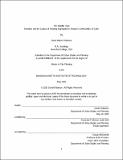The stability gap : evictions and the legacy of housing segregation in Boston's communities of color
Author(s)
Robinson, David Bloom.
Download1193561388-MIT.pdf (3.030Mb)
Other Contributors
Massachusetts Institute of Technology. Department of Urban Studies and Planning.
Advisor
Justin Steil.
Terms of use
Metadata
Show full item recordAbstract
If you go to Boston Housing Court on a Thursday morning, when most eviction cases are scheduled, you will find that a disproportionate amount of the hundreds of people waiting to defend against an eviction are people of color -- even though roughly half of Boston's population is white. In Boston, like many other cities in the country, the fear, stigma, trauma, and economic hardship of being forced from your home is an experience disproportionately felt by people of color. Yet without clear data, these disparities are often hidden to people who aren't directly affected. I have partnered with City Life/Vida Urbana, a grassroots tenants' organization, to provide rigorous data and research that organizers, advocates, and policymakers can use to support movement-building and tenant protections policy. Using eviction records from Boston Housing Court between 2014 and 2016 merged with data on census tract characteristics from the U.S. Census Bureau and property assessment data from the Boston Assessing Department, this research reveals patterns in the neighborhoods and properties most affected by evictions. The research finds that eviction filings are heavily concentrated in low-income neighborhoods of color. Above and beyond indicators of poverty, eviction filings are more likely in neighborhoods with a higher share of Black renters, and lower educational attainment. Within neighborhoods, eviction filings are also more likely in non-owner-occupied properties, and properties that have been more recently constructed or renovated and have a higher assessed value per square foot. These disparities are arguably a legacy of decades of housing segregation in Boston that has systematically disadvantaged renters of color. I recommend significantly stronger tenant protections at the state and municipal level to mitigate the chronic housing insecurity faced by many of Boston's communities of color, particularly as the COVID-19 pandemic further threatens the housing stability of these communities..
Description
Thesis: M.C.P., Massachusetts Institute of Technology, Department of Urban Studies and Planning, May, 2020 Cataloged from the official PDF of thesis. Includes bibliographical references (pages 81-89).
Date issued
2020Department
Massachusetts Institute of Technology. Department of Urban Studies and PlanningPublisher
Massachusetts Institute of Technology
Keywords
Urban Studies and Planning.